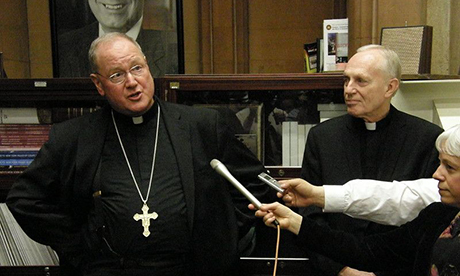The Archdiocese of New York has argued that records compiled under ‘Vos estis lux mundi,’ a Vatican-ordered sexual abuse investigation of a retired bishop are protected by the First Amendment.
In 2019, Albany Bishop Howard Hubbard, along with two other priests was accused of sexually abusing a female in the late 1970s when she was a teenager.
JoAnn Harri, a lawyer for the plaintiff, attempted to subpoena archdiocesan records of the Vos estis investigation into Hubbard.
The case raises questions about the confidentiality of the Vos estis lux mundi process, promulgated by Pope Francis in 2019 as a mechanism for investigating allegations of abuse or misconduct against bishops.
New York’s Cardinal Timothy Dolan (pictured with Hubbard) was directed in early 2021 to investigate multiple claims against Hubbard. Dolan admitted last year that he transferred several priests to new parish ministries without contacting police, after they were accused of sexual abuse.
In a court filing last month, the archdiocese said it had already turned over some records, and that “the Vos estis investigation is part of an exclusively canonical process related to the Catholic Church’s right to select its ministers, which process is privileged from disclosure.
“The Archdiocese possesses First Amendment protection of its religious processes undertaken pursuant to Catholic law,” the filing argued, and “religious leaders of an organised religion should not be forced to disclose their internal judicial processes, the ultimate goal of which is to determine whether a cleric may remain in ministry.
“Civil courts must refrain from adjudicating a plaintiff’s claim if the court would unconstitutionally impede the church’s authority to manage its own affairs,” the archdiocese added.
Harri told The Pillar last week that her client’s request is reasonable and important.
“In every case involving a priest, we have been able to get their personnel and disciplinary files if they are a named perpetrator. But here you have a situation where you have a victim of not just a priest, but a bishop, and all of the sudden, she’s not entitled to that.”
“So, if the First Amendment would preclude those disciplinary files from being released — and of course they’d redact the names of victims — but if it would preclude that, then that would mean that a victim of a bishop has less rights to discovery than the victim of a parish priest.”
Harri told The Pillar (Catholic News) that she’s unsure whether a ruling in her lawsuit would affect other states where Vos estis investigations are taking place.
“I don’t know what impact it would have…presumably, it could have an impact on dioceses across the country, but a lot depends on state-by-state laws too. So, we’ll have to see how the court handles this.”
But while Harri was cautious about too much speculation, the archdiocese was direct about its belief that a ruling to hand over records would have far-reaching effects.
“The chilling and pernicious effect of disrupting internal Church governance and invading the administration of Church law is undeniable,” an archdiocesan filing claimed.
“The Court should deny the motion to compel as violative of the Archdiocese’s rights pursuant to the First Amendment of the United States Constitution and Article 1 of the New York State Constitution and well-settled federal and state law.”
